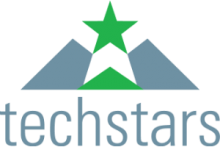Magic Pens, Goliath Defiers, &; More at Techstars Boston Demo Day

Beneath the carefully rehearsed pitches, corny one-liners, and overall pomp and circumstance at Techstars Boston’s 10th demo day Wednesday night, it’s clear that the startup accelerator’s local outpost continues to build solid (if not always flashy) businesses.
It’s been seven years since Techstars launched in Boston, its first hub outside of its Boulder, CO, home. Last night’s demo event felt like a celebration not only of the latest group of graduating companies, but also the Boston program itself. Techstars co-founders Brad Feld and David Brown were in town for the event. Former Techstars Boston managing director Katie Rae and serial entrepreneur and investor Bill Warner—who helped bring Techstars to town—were also on hand to introduce two of the presenting companies.
“Now we’re in the John Hancock auditorium. After this, it’s Fenway,” Warner joked, his enthusiasm for the program running as strong as ever.
“Techstars Boston wouldn’t exist if Bill Warner hadn’t flown out to Boulder in year two, invested in a company … and pulled us kicking and screaming to do something in Boston,” Feld recalled.
Techstars has since expanded to 23 locations across four continents, Brown said. More than 750 companies have gone through its various accelerator programs and raised more than $ 2 billion from investors to date, Techstars says.
Boston is one of Techstars’ more successful outfits. It counts GrabCAD, DocTrackr, UberSense, and ThriveHive among its exits. Its well-funded and rapidly expanding alums include Placester and PillPack.
It’s too early to predict how the latest batch of 14 startups will fare, but there were signs that many of them are on the right track.
Daily Pnut said it has more than 35,000 subscribers to its e-mail that delivers global news in an entertaining and easily digestible format. Seed&Spark’s crowdfunding platform has enabled more than 40,000 individuals to provide $ 5 million-plus to over 250 independent films. Taylor & Hart, the online bespoke engagement ring retailer formerly known as Rare Pink, has more than 1,000 customers, generated $ 300,000 in sales last month, and turned its first profit, CEO Nikolay Piriankov said.
Navut, a real estate software and relocation planning startup, has reached $ 20,000 in monthly recurring revenue and is closing in on a $ 1 million funding round, digital marketing strategist Jéssica Carmona told Xconomy before the event.
Navut’s product is “miles ahead of where we were at their stage,” Placester co-founder and CEO Matt Barba said as he introduced Navut co-founder Marcos Azevedo on stage.
The companies’ collective results aren’t that surprising—Techstars Boston has shifted to primarily selecting more mature companies that often already have revenue before entering the program, managing director Semyon Dukach said at the beginning of this session in February.
Here are three startups from the latest session that stood out to me, for various reasons:
—Most ambitious: Seed&Spark. This L.A.-based company is trying to upend Hollywood with its crowdfunding site, which aims to get indie flicks funded and make sure more of a film’s earnings go to the artists. Users can also pay a few bucks to watch the movies on Seed&Spark’s website. But reshaping a decades-old production and distribution business model controlled by powerful media conglomerates will be a huge challenge, to put it mildly.
On top of that, Seed&Spark now wants to take on Netflix, Hulu, Amazon, and others by offering a subscription service that allows customers unlimited access to its streaming films and TV shows for $ 10 per month, with half of that money funding indie projects of the person’s choice, CEO and co-founder Emily Best said.
—Biggest potential impact: Spoiler Alert. This MIT-born startup is trying to reduce food waste through its online marketplace that enables farmers, grocers, and other food businesses to sell or donate surplus food to nonprofits and other organizations. Spoiler Alert doesn’t handle the transportation of food, but its software manages the connections, communications, payments, and data tracking for customers.
If successful, this could help solve a couple of big problems: 50 million Americans don’t get enough to eat, while there’s about $ 75 billion in unsold inventory and other lost revenue at food businesses each year, Spoiler Alert co-founder and CEO Ricky Ashenfelter said.
His company estimates there are 50,000 nonprofits in the U.S. dedicated to fighting hunger, and they’re “spending each and every day looking for more food to recover,” he said. “There’s a giant communications gap and lack of real-time responsiveness for unsold inventory. We want to change this.”
It’s an example in which software could solve an important problem in society—and make money along the way.
—Coolest technology: Rocketbook. This Boston startup’s app can snap a photo of your handwritten notes, enhance the image, and send it to online storage services like Dropbox, Evernote, or an e-mail address.
But the nifty part? It has developed a special notebook that you can reuse after microwaving it. You read that right. Rocketbook worked with Pilot Pen to create pens that use “thermochromic” ink that turns invisible when exposed to heat. Just don’t leave the notebook in your car on a hot day.
(41)













